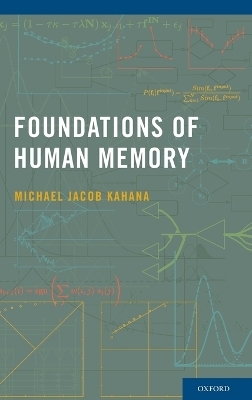
Foundations of Human Memory
Oxford University Press Inc (Verlag)
978-0-19-533324-4 (ISBN)
Michael Jacob Kahana, PhD, is Professor of Psychology at the University of Pennsylvania. Kahana's research focuses on basic mechanisms of human memory through use of direct brain recordings and computational modeling of behavioral data. Kahana has published more than 100 peer-reviewed journal articles on the psychology and neuroscience of human memory. He was the 2010 recipient of the Troland Research Award from the U. S. National Academy of Sciences.
1 Introduction ; 1.1 Historical Background ; 1.2 Association, Context, and Episodic Memory ; 1.3 Methods Used in Studying Memory ; 1.4 The Laws of Repetition and Recency ; 1.5 Cognitivism ; 1.6 Organization of the Book ; 2 Item Recognition ; 2.1 Strength Theory ; 2.2 Multiple Sources of Strength? ; 2.3 Major Findings Concerning Item Recognition ; 2.4 Sternberg's Procedure ; 2.5 Summary and Current Directions ; 2.6 Study Questions ; 3 Attribute Models ; 3.1 Attributes ; 3.2 A Multi-trace Distributed Memory Model ; 3.3 Similarity Effects ; 3.4 The Diffusion Model of Reaction Time ; 3.5 Context Revisited ; 3.6 Summary and Current Directions ; 3.7 List-strength Effect ; 3.8 A Unitrace Attribute Model ; 3.9 Study Questions ; 4 Associations and Cued Recall ; 4.1 Major Associative Tasks ; 4.2 Encoding and Repetition ; 4.3 Recency and List Length ; 4.4 Retrieval Errors ; 4.5 Retroactive Interference and Recovery ; 4.6 Proactive Interference ; 4.7 Context and Interference Theory ; 4.8 Similarity and Interference ; 4.9 Unlearning as Inhibition ; 4.10 Interference Theory: Concluding Remarks ; 4.11 Item and Associative Information ; 4.12 Summary and Current Directions ; 4.13 Study Questions ; 5 Models of Association ; 5.1 The Attribute-Similarity Framework ; 5.2 Neural Network Models ; 5.3 Summary and Current Directions ; 5.4 More on Linear Associators ; 5.5 Project: Cued Recall in a Hopfield Net ; 5.6 Study Questions ; 6 Free Recall and Memory Search ; 6.1 Serial-position Effects ; 6.2 Retrieval Dynamics ; 6.3 Semantic Clustering ; 6.4 Intrusions ; 6.5 Repetition Effects ; 6.6 Summary and Current Directions ; 6.7 Study Questions ; 7 Models of Free Recall ; 7.1 Dual-store Memory Search Models ; 7.2 Testing Dual-Store Models ; 7.3 Problems for Dual-store Models ; 7.4 Single-store retrieved-context models ; 7.5 Testing Retrieved Context Theory ; 7.6 Summary and Current Directions ; 7.7 Study Questions ; 8 Sequence Memory ; 8.1 Serial Recall and Memory Span ; 8.2 Serial-Position Effects ; 8.3 Modality and Suffix Effects: Evidence for a phonological STS? ; 8.4 Recall Errors ; 8.5 Associative Asymmetry ; 8.6 Grouping Effects ; 8.7 Summary and Current Directions ; 8.8 Study Questions ; 9 Theories of Sequence Memory ; 9.1 Associative Chaining ; 9.2 Positional Coding ; 9.3 Eight Critical Findings ; 9.4 Chaining vs. Positional Coding ; 9.5 Hierarchical Associative Theory ; 9.6 Summary and Current Directions ; References ; Author Index ; Index
| Zusatzinfo | 107 line art |
|---|---|
| Verlagsort | New York |
| Sprache | englisch |
| Maße | 239 x 163 mm |
| Gewicht | 635 g |
| Themenwelt | Geisteswissenschaften ► Psychologie ► Allgemeine Psychologie |
| Geisteswissenschaften ► Psychologie ► Biopsychologie / Neurowissenschaften | |
| Geisteswissenschaften ► Psychologie ► Verhaltenstherapie | |
| ISBN-10 | 0-19-533324-1 / 0195333241 |
| ISBN-13 | 978-0-19-533324-4 / 9780195333244 |
| Zustand | Neuware |
| Informationen gemäß Produktsicherheitsverordnung (GPSR) | |
| Haben Sie eine Frage zum Produkt? |
aus dem Bereich


